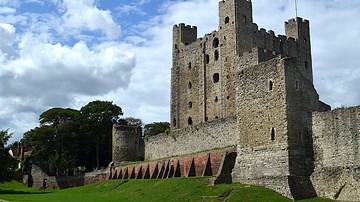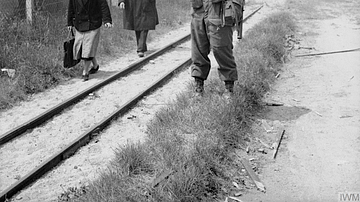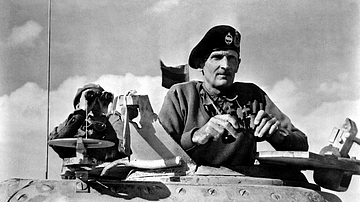Search
Search Results

Definition
Rochester Castle
Rochester Castle, located in Kent, England, was first constructed shortly after 1066 CE by the Normans, was converted into stone between 1087 and 1089 CE, and then added to over subsequent centuries, notably between 1127 and 1136 CE, and...

Article
Battle of Stamford Bridge
The Battle of Stamford Bridge in Yorkshire, England on 25 September 1066 CE saw an army led by English king Harold II (r. Jan-Oct 1066 CE) defeat an invading force led by Harald Hardrada, king of Norway (r. 1046-1066 CE). Hardrada, aided...

Article
Vikings TV Series - Historical Accuracy
Vikings (2013-present) is a historical fiction TV series created and written by English screenwriter Michael Hirst for the History Channel. Filmed in Ireland, the show draws on Scandinavian and European history and lore as it follows the...

Article
William the Conqueror's March on London
William the Conqueror (r. 1066-1087 CE) was victorious at the Battle of Hastings in October 1066 CE, and Harold Godwinson, King Harold II of England (r. Jan - Oct 1066 CE) was dead. The English throne and kingdom were there for the taking...

Article
The Civilian View of D-Day
The Normandy landings in France, which began on D-Day, 6 June 1944, involved the largest troop movement in history, but in this article, we focus on the view from civilians directly involved in that momentous day when the Allies sought to...

Definition
King John of England - England's Most Unpopular King?
King John of England (aka John Lackland) ruled from 1199 to 1216 CE and he has gone down in history as one of the very worst of English kings, both for his character and his failures. He lost the Angevin-Plantagenet lands in France and so...

Definition
Charlotte Corday
Charlotte Corday (1768-1793) played a prominent role in the French Revolution (1789-1799) when she assassinated radical activist Jean-Paul Marat in his bathtub on 13 July 1793. Despite her aristocratic background, Corday was an avowed republican...

Definition
Sir William Marshal - England's Greatest Knight
The Englishman Sir William Marshal (c. 1146-1219 CE, aka William the Marshal), Earl of Pembroke, is one of the most celebrated knights of the Middle Ages. Renowned for his fighting skills, he remained undefeated in tournaments, spared the...

Definition
Flour War
The Flour War refers to the series of approximately 300 riots that swept through France from April to May 1775, because of rising bread prices. The revolts only subsided after soldiers had been deployed, resulting in hundreds of arrests...

Definition
Bernard Montgomery
Field Marshal Bernard Montgomery (1887-1976) was one of Britain's top commnaders in the Second World War (1939-45). He famously defeated Erwin Rommel (1891-1944) at the Second Battle of El Alamein in North Africa in November 1942. Known for...